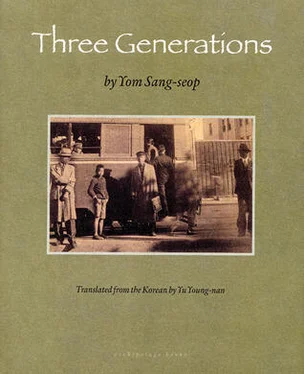After extensive consultation, the two doctors asked Deok-gi to bring them the Chinese herbal prescriptions and whatever dregs of the medicine remained. Suspicion had now shifted to the Chinese medicine doctor. Deok-gi went to see him personally, hoping to find some sort of a clue.
The Chinese doctor accompanied Deok-gi to the hospital, explained his diagnosis to the family and other doctors and shared his prescriptions with them. He had been treating the patient for internal weakness due to a cold, but he hadn’t been aware that pneumonia was the cause of the fever. In any event, there was no evidence of any toxic substance to be found in his prescription, and nothing remained of the medicine itself.
The patient was given an antidote, but it caused a kidney inflammation and stomach catarrh, and he began to lose his eyesight. In light of these symptoms, the diagnosis of arsenic poisoning became decisive, and the hospital doctor grew desperate.
Amid the commotion, the Suwon woman stayed in bed for three days, claiming that she had a cold and her body ached all over. On the day of the operation, though, she did visit but moaned and groaned so much it was embarrassing to hear her. From the sound of it, you’d have thought the young wife was going to die before the old man.
The women went so far as to poke fun at her. “You’re exhausted because you had to take care of your sick husband for so long,” they said. “We were afraid that you might die of exhaustion while taking care of him.”
“What more could I wish for if I could die first?” said the Suwon woman between short breaths, prompting a peal of laughter from the women.
The operation finally took place, and the fever abated, but the ordeal pushed the patient into a coma. Without opening his eyes for two days, his breathing grew shallower until, at last, it stopped.
The doctor, afraid that the family wouldn’t understand what had happened and blame him for hastening the patient’s death with the operation, explained that arsenic poisoning was the cause, and everyone accepted it. No one in the family would speak their mind about the cause of the poisoning, yet they regarded it as a criminal case.
When the doctor raised the subject of performing an autopsy for research purposes, Sang-hun, the head mourner, expressed agreement before anyone else had a chance to offer an opinion. Deok-gi had actually wanted to suggest a postmortem, but he didn’t dare open his mouth, afraid to provoke his relatives’ complaints and accusations.
Sure enough, Sang-hun was showered with abuse.
“Are you crazy? Do you want to besmirch the Jo family name?” Chang-hun spewed accusations. And his weren’t the only ones.
How can a fifty-year-old man have so little sense? What kind of bastard wants to rend his parent’s body apart piece by piece, like a butcher slaughtering a cow? Who in the world would do such a thing? How could the body be brought to the coffin room at the funeral? The debates grew more vehement.
The old gentleman was his parent, not his enemy! Just because his father said some unpleasant things to him while he was alive, it doesn’t justify his trying to humiliate him by hacking his dead body apart with a knife. If Sang-hun is sane, he should be killed and dismembered. If he’s insane, he should be confined to an animal shed or else beaten to death by the Jo clan. Chang-hun freely encouraged such sentiments among the mourners.
No one would be surprised if such a man had given his father arsenic. He wants the corpse torn to pieces to get rid of the evidence because he’s afraid his crime will be discovered. Then he’ll either burn the pieces or leave them to float in bottles in some corner of the hospital and walk away from the matter. Clerk Choe and Chang-hun spread notions like these to anyone who would listen. Everyone thought it made sense. In the meantime, the Suwon woman bawled hysterically, and dozens of people spoke up to put in their two cents worth. A corner of the hospital might as well have been destroyed from the racket they made. Sang-hun ended up like a crushed horsehair hat and was forced to sit quietly for the time being. It was not that he had nothing to say or that he didn’t have a mouth with which to say it, but as the blade of the attack was so sharp, he thought he’d better be cautious. If the key to the safe had fallen into Sang-hun’s hands, they wouldn’t have insulted him to such an extent. Rather, Chang-hun would have said, “I think it’s strange, too. Let them do the autopsy.” But in fact, Sang-hun didn’t think that an autopsy was absolutely necessary. He agreed to the idea because he thought that if a vicious conspiracy existed, it should be uncovered. He changed his mind, however, telling himself that there was no need for an autopsy when two doctors had confirmed the cause of death. There would be other ways to make it an issue if necessary — after his father was buried. The truth was that even though he didn’t subscribe to the traditional distaste for such things, Sang-hun was loath to see a knife cutting into his father’s still-warm body. In the heat of the moment, Chang-hun made Sang-hun out to be the bad guy, and indeed his accusations sounded plausible, but Sang-hun decided to wait for the right time, convinced that a hideous crime couldn’t be concealed forever.
I’ll bide my time, Sang-hun thought. How long will you bastards remain so confident?
Before starting preparations for the funeral, the corpse was transferred to an ambulance and taken to the house, where it was laid out. When the funeral ritual began, Sang-hun didn’t perform the ceremonial keening. This became another point of contention, but Sang-hun stood his ground. His eyes were dry, and he felt no regret. Sang-hun believed his reaction was far more honest than that of the Suwon woman, who squeezed tears out until her eyes swelled and than that of Chang-hun, whose mournful wails struck a false note.
Sang-hun was completely ignored. Though Deok-gi didn’t wear the mourning clothes of unbleached hemp reserved for the head mourner, his role was no different from that of a grieving grandson whose father had died before his grandfather. The visitors bowed once to Sang-hun to pay their condolences, then gathered around Deok-gi to chat with him. Chang-hun took charge of every decision, either by getting permission from Deok-gi or approval after the fact.
Sang-hun had no choice but to sit awkwardly, like a borrowed sack of barley, in the warmer part of the big room in the outer quarters. Deok-gi, sorry that his father was being shunned, took pains to consult him about everything. Deok-gi felt it was only right to ask his father’s opinions. Deok-gi’s solicitousness notwithstanding, Sang-hun remained aloof. Whatever was asked of him, he said, “Do as you see fit. You can discuss it with the others and find the right solution.” Though he didn’t show it, Sang-hun was deeply hurt.
It irritated Deok-gi to be caught in the middle. Things were so chaotic and money was snatched away ever so quickly by swooping relatives eager to take advantage of the situation and get their crumbs that soon the bickering and fighting began. This was the mood as the funeral procession began on the seventh day after the old man’s death. No matter how one looked at it, this was a propitious mourning — a rich man dying at a ripe old age. People wondered if the head mourner would wear a frock coat, but he was dressed in traditional mourning garb and rode a reed palanquin, followed by more than two hundred rickshaws slithering like a snake’s tail.
Bystanders gathered along the road from early morning without any food in their stomachs. What a magnificent procession! What a lucky life he had! Life is so unfair. When I go to my grave, I bet I’ll be carried in a twenty-two-handle bier, not one with just twelve handles like him. Who could have fathomed how many vices, roars, and resentments would linger in the wake of this funeral procession?
Читать дальше












